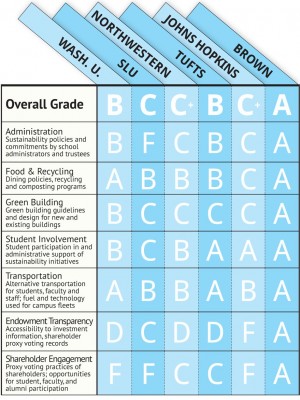News
Group gives WU same grade in sustainability as last year
2nd straight B; students, staff question group’s methodology
Washington University has earned a B in a national group’s annual report card on college sustainability practices for the second straight year, but students and faculty are questioning how the group came up with its results.
Greenreportcard.org is a program designed by the Sustainable Endowment Institute (SEI) and claims to be the first website to present sustainability profiles for hundreds of colleges in the United States and Canada. Each university is assigned a letter grade in multiple categories and these grades are then averaged to determine each institution’s final sustainability GPA.
The grades are based on surveys and studies conducted over a period of two months by both school administrators and independent researchers. The Office of Sustainability provides information in response to surveys that the University receives.
Overall, Washington University earned A’s and B’s across many categories. But the University received a D for endowment transparency and an F for shareholder engagement.
Students believe that the report card is an indication that while the University is taking steps toward providing a more sustainable environment, there is still much work to be done.
“The breakdown of the grades reflects room for huge improvement in issues regarding the endowment,” said junior Arielle Klagsbrun, co-president of Green Action. “We still believe there’s much work to be done on campus, but we are glad to see excellent grades in food and transportation.”
Some students said they feel the University didn’t deserve its A rating in the climate change and energy category because of its ties to coal production.
“Although the University does work to reduce overall energy use, Wash. U.’s reliance on coal as its primary energy source is not sustainable,” Erika Gould, a 2010 Wash. U. alum, said. “That makes me question the A we received in the climate change & energy category.”
School officials also question the legitimacy of the grading.
“I don’t think the grade is fair,” said Daniel Bentle, the communications coordinator of the Office of Sustainability. “We’re trying to develop our own definition of sustainability. The report [does not] provide a concrete definition of sustainability.”
According to Bentle, universities must make public all information regarding their assets to get a high score in endowment transparency. This information, however, is under the administrative office’s control and not made available to the Office of Sustainability.
As for the shareholder engagement category, Bentle said that the schools that got a high mark have committees designed specifically to address those issues, and the University does not currently have a committee that deals primarily with sustainability issues.
The Strategic Plan for Environmentally Sustainable Operations, created by the Sustainable Operations Leadership Council, states that reducing the University’s emission of greenhouse gases is its primary goal toward sustainability.
Bentle also pointed out that there are many inconsistencies between the grades for different schools. A PowerPoint presentation on the ratings shows discrepancies, such as University of California, Berkeley’s transportation rating. While Cal received an A in 2009, it received a B in 2010 after the University had increased the students and staffs’ use of alternative transportation.
Another example of inconsistencies is University of Columbia’s green building rating. Columbia received an A in 2009 for its five certified Leadership in Environmental and Energy Design (LEED) buildings, but it received a B in 2010 after the number of LEED-certified buildings had increased to six and the number of buildings that met LEED criteria reached 14.
“We’re looking for a more transparent, more objective grading system,” Bentle said.
According to Inside Higher Ed, there is an open letter that is circulating among university sustainability officers that questions and debates the usefulness and the accuracy of the assessments made by SEI’s College Sustainability Report Card. The open letter was signed by two dozen officers and was released in July 2010.
At this point, the University has not yet decided whether to participate in SEI’s report for the next school year.

